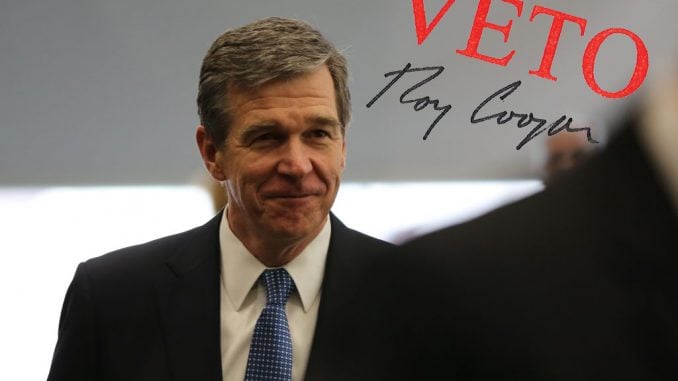
RALEIGH — On June 19, Democratic Governor Roy Cooper signed several bills into law but vetoed three; reaching a new state record of 81 vetoes across his two terms as governor.
The four governors with veto power who preceded Cooper had a combined total of 53 vetoes among them. Cooper’s 81st veto means he holds 70% of all vetoes issued by a North Carolina governor to date.
Cooper vetoed Senate Bill 331 (Consumer Finance Act Amendments), Senate Bill 329 (Retail Installment Sales Act Amendments) and Senate Bill 299 (Reimburse Late Audit Costs with Sales Tax Rev.).
“At a time when the cost of living is rising, North Carolina consumers cannot afford to be hit with higher fees and interest rates on loans,” Cooper wrote in his veto of Senate Bill 331.
On Senate Bill 339, the governor’s veto message was similar to that of 331, citing the “rising cost of living.”
“At a time when the cost of living is rising, North Carolina consumers cannot afford to be hit with higher fees and interest rates on loans and purchases,” wrote Cooper in his veto of Senate Bill 339.
Senate Bill 299 garnered the governor’s longest veto message.
“It is important that local governments follow the law on auditing their finances in order to foster accountability and fiscal responsibility. While well intentioned, this legislation as written is likely to punish residents of some of our state’s smallest communities,” Cooper wrote. “Rather than having state government seize sales taxes that are needed for local government, the North Carolina General Assembly should reconsider this legislation and provide more help for these communities to make sure they do it right rather than impose financial punishment that could make matters worse.”
N.C. State Treasurer Dale Fowell, a Republican, and State Auditor Beth Wood, a Democrat, issued a joint statement criticizing the governor’s veto of Senate Bill 299.
“We are disappointed in Gov. Cooper’s veto of S299. The bill passed with overwhelming bipartisan support – 43-0 in the Senate and 84-30 in the House,” wrote Folwell and Wood.
“As members of the Local Government Commission (LGC) we see the leadership of many counties and municipalities perennially failing to submit audits on time to the LGC. When the leadership of governmental units fail to submit timely audits, the state has no insight as to whether they are in financial difficulty,” the treasure and auditor said in the statement. “The taxpayers hurt by this lack of transparency are often those on lower and fixed incomes. We encourage the General Assembly to quickly override the Governor’s veto in order to protect those that are most vulnerable.”
Republicans hold supermajorities in both chambers of the North Carolina General Assembly, making successful override votes of the governor’s vetoes a likely bet.
Cooper signed two pieces of legislation: Senate Bill 729, titled CBBC Working Group Changes, and Senate Bill 58, titled Protect Critical Infrastructure.
The latter bill seeks to protect energy and water infrastructure sites after several substations were attacked in 2022. The bill received unanimous approval in both chambers of the General Assembly.
“We must protect critical infrastructure that keeps electric power and clean water available in our communities, and this bill sends a message to criminals that these irresponsible acts will not be tolerated,” Cooper said of Senate Bill 58.


